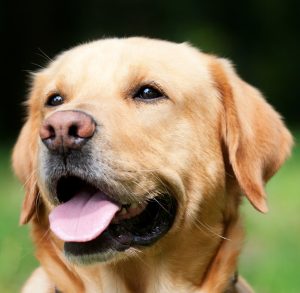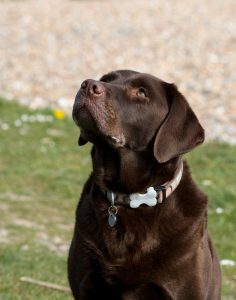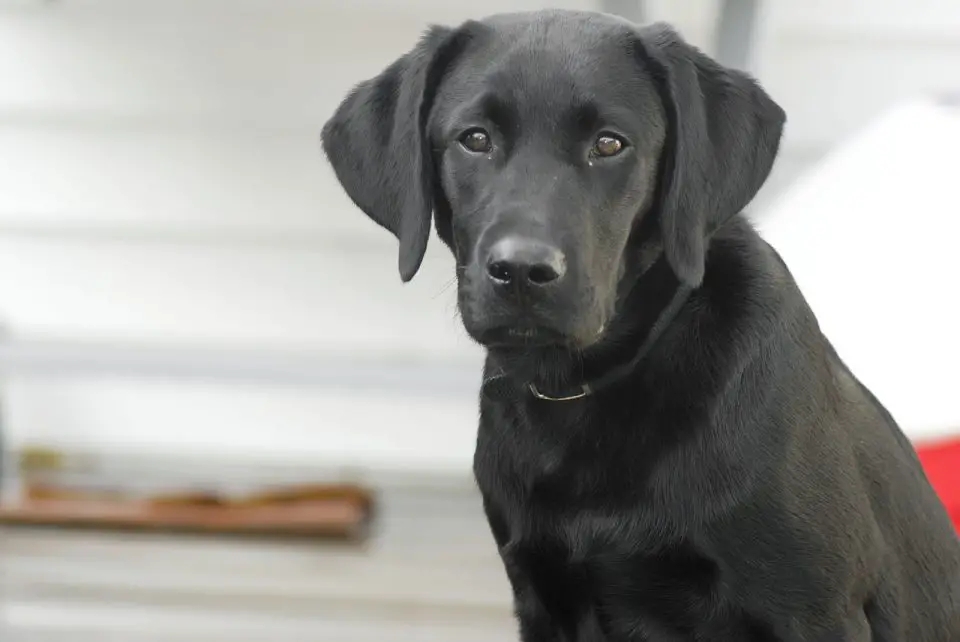Most dog parents are well aware that owning a dog means living with dog hair. Shedding is a natural part of any dog breed, but it can be a real pain for those who are also trying to keep a clean home!
An extremely popular dog breed that is known for their shedding is the Labrador Retriever. Labs are one of the most famous and common breeds you can find, but they are also notorious for shedding.
Whether you already have a lab or you are considering bringing one home, this article can help dog owners understand a little more about how much labs shed and why.
Plus, we have a few tips and tricks to help control shedding!
By the way – my name is Bri and I’m no stranger to dog hair! I’m a dog mom myself to an American Bulldog named Bruce.
Bullies are also known to shed like crazy, so I’ve tried many different methods to keep my home as clean as possible.
I’ll share some of those with you later! First, let’s talk about labs.
History of Labs
When I was a kid we always had labs. My family had three labs over the years and I’m pretty sure we can still find their hair in a few dark corners of the house!
Labrador Retrievers were initially bred for the exact same thing they are good at today – retrieving! Hunters and fisherman used these pups to retrieve their game for them.
Originally a Canadian breed, their short, weather resistant coats were perfect for tracking through mud, chilly water and snow without slowing them down.
Overtime, their loyalty and cute facial expressions have won them a high ranking in the most loved family dogs.
What is a Lab’s Coat Like?
As I said before, labs have a short, water resistant coat. This helps them repel water when retrieving game.
The coat is wiry and dense to help water slide right off. Labs have what is called a double coat with an under layer that is thick for warmth and a top coat that holds oils to increase weather resistance.
A lab’s coat comes in three different colors; Chocolate, Black and Yellow. I have had one of each and their coats are all essentially the same aside from the color!
Labs also have what I call velvet ears. I have owned many dogs, but I don’t think I have ever had a dog with ears as soft as a lab’s!
Do Labs Shed?
Is ice cream cold? Yes. Labs absolutely shed. Their double coat makes it essential for their skin’s health.
This is a natural trait for any lab, no matter what color.
How Much do Labs Shed?

To put it bluntly, a lot. Labs are one of the heavier shedding dog breeds you can get. However, it is manageable!
We’ll get into how to control shedding later, but it is important to know what you are getting into if you want to bring home a lab. Be prepared for a ton of dog hair!
Don’t worry though – they are completely worth it!
When do Labs Shed the Most?
While labs shed pretty steadily year-round, there are certain points where they shed more or less than normal. Here are a few things that can affect how much a lab sheds:
Time of year
This is a big one! Almost all dog breeds shed heavily twice a year. This usually happens during the changing seasons, from winter to spring and from summer to fall.
Labs shed their heavy winter coat so they don’t overheat in the summer. Once the weather starts to cool, they’ll start shedding that light summer coat to make room for a thicker winter one.
Stage of life
A dog’s age can certainly affect how much it sheds. Puppies specifically will shed their super soft puppy fur as they age.
Once they hit adulthood, the shedding starts to level out and becomes pretty regular. The same happens as they get older.
Old dogs tend to shed a bit more often as they age. This is totally normal!
Poor diet
This is actually something dog owners should be weary of. Labs require a high quality, nutritional diet to keep up with their high energy.
If a lab is given a poor diet, it can poorly affect the growth of their fur. A well balanced, healthy diet will show in a gorgeous, healthy coat.
Poor diets will result in dry skin, patchy fur and even sometimes discoloration.
Ticks, fleas and other pests
Gross, but realistic. Labs are outdoor lovers and like to be where the bugs are! This makes them especially susceptible to ticks, fleas and other pests.
These bugs can cause irritations in a dog’s skin that will be noticeable in the fur. More importantly, bugs like ticks can carry diseases that are dangerous for a dog.
Changes in fur texture and color can be a big warning sign, so definitely keep an eye out for them.
Excessive licking and skin irritations
Ever heard of a hot spot? If not, consider yourself lucky!
Hot spots are skin irritations that can be cause by multiple factors, but usually have something to do with dry skin or allergies.
When a dog gets a hot spot, their natural instinct is to lick their wounds. However, excessive licking can cause fur to fall out and make the hot spot worse!
How to Combat Lab Shedding?
There are several ways to help combat with your lab’s shedding, but please remember that they NEED to shed. There is no way to completely stop a dog from shedding, nor should they be.
Here are some of the top ways to help combat Lab shedding:
Regular baths with high quality shampoo
First off, there is such a thing as over-bathing your dog. Labs don’t need a bath every week! Stick to once a month unless they get particularly dirty on one of your adventures.
Using a high quality shampoo is also crucial. There are plenty of de-shedding shampoos out there, but one of my favorites is Honeydew’s oatmeal dog shampoo.
It has soothing qualities that help moisturize skin and control shedding, and it’s not full of harsh chemicals like many dog shampoos are.
Brushing
Giving a lab a really good brushing about once or twice a week will make a huge difference. I’ll talk about my favorite dog brush in the next section!
Equipment Help to Combat Lab Shedding:
There are many things you can use to help you combat lab hair. However, I’m only going to share the top two that I use all the time that have always worked best for me.
I obviously have an American bully now, but their coats are actually very similar to a lab. Plus, I’ve had labs before and we used the same tools on them!
FURMINATOR! This dog brush is the only thing I will ever use on my dogs. It gets through to that undercoat to really grab loose hair.
The proof will be on the ground after you are done – it will look like another dog is laying there! I use it on Bruce twice a week and every time I am amazed at how much fur comes out.
Plus, he thinks he’s getting a nice long back scratch the whole time! I have also noticed that it grabs and removes pet dander which has really helped with my allergies.
They Dyson cordless vacuum for dog hair. Let me be clear, there are plenty of great vacuums for dog hair out there.
This is just the one I have and I LOVE it.This one is cordless and comes apart, which makes it super easy to get furniture and stairs.
It is one of the more expensive vacuums on the market, but it is an investment that will last for a very long time and it is SO worth it!
Are Labs Considered to be Hypoallergenic?
Absolutely, unequivocally, no. There is NOTHING hypoallergenic about a Labrador Retriever.
If anything, they might be one of the worse breeds for triggering pet allergies because of their shedding and pet dander. Still worth getting one though, just stock up on your allergy meds!
While we’re here, I want to take the time to clarify that no dog is truly hypoallergenic. Every dog loses hair and dander, which is typically triggers allergies.
There are of course dogs who shed much, much less and therefore are known as ‘hypoallergenic’ dogs.
That does not mean they are fully hypoallergenic, so don’t be surprised if you are still sneezing around your Shih tzu!
Do Some Labs Shed More Than Others?
Typically labs show the same shedding habits across the board. There are always special circumstances that could change that though.
Age, climate, diet and everything else I mentioned earlier could cause one lab to shed more than another.
Climate is probably the biggest factor in that equation because it directly effects the need for the dog to have a lighter or heavier coat!
A lab that lives in extreme heat will probably show different shedding habits than one who lives in extreme cold. It will differ with every dog!
Health Reasons for Increased Shedding in Labs
Shedding is a natural trait in all dogs. Labs especially require regular shedding to keep their skin healthy.
Without shedding, all the natural oils in a lab’s fur will collect and build up. This could cause skin irritations and further problems for the pup.
There are also certain health concerns that could show symptoms through excessive shedding. Dogs like labs are prone to ear infections, which can cause them to scratch around their ear.
This could cause hair loss and should be treated as soon as possible. Another unfortunate cause of excessive shedding is cancer which can happen in many dog breeds and take many forms.
When my lab, Hershey, was diagnosed with cancer, we took him to the vet because we could tell his coat was falling out in large sections which was very strange.
Sadly, he was so old that it didn’t take long for the cancer to take him.
We were glad that we paid attention to his shedding habits so we knew something was wrong and we were able to spoil him and give him lots of love in his final days!
I still get teary eyed when I see pictures of his beautiful chocolate face!
Final Thoughts
 I am a huge dog lover, so I will always be supportive of people owning a dog. Especially a lab.
I am a huge dog lover, so I will always be supportive of people owning a dog. Especially a lab.
Labs will always be one of my favorite dog breeds. They are one of the most loving, loyal and family friendly dogs I have ever had.
They have high energy which was perfect for my sister and I and our crazy energy levels as kids.
Not to mention that they are also some of the darn cutest animals on the planet (that’s an opinion, but also a fact).
When it comes to shedding, it all depends on what you as an owner deem worth having a lab.
If you are okay with cleaning up dog hair and vacuuming a few days a week, then there is nothing holding you back.
There are so many tricks and ways to help keep your home clean that I could never imagine saying no to owning a lab just because of the dog hair.
Shedding can be a pain, but it is manageable if you have the patience to deal with it.
However, if you do not want to deal with the maintenance and cleaning required with owning a lab, they probably are not the right breed for you. And that’s okay!
There are plenty of other great dog breeds out there (like American Bulldogs!). I hope all of this information was helpful!
Just remember that shedding is a good thing for dogs, and do your research before bringing home a puppy. That includes making sure your family is not allergic!
Happy Pup Parenting!



